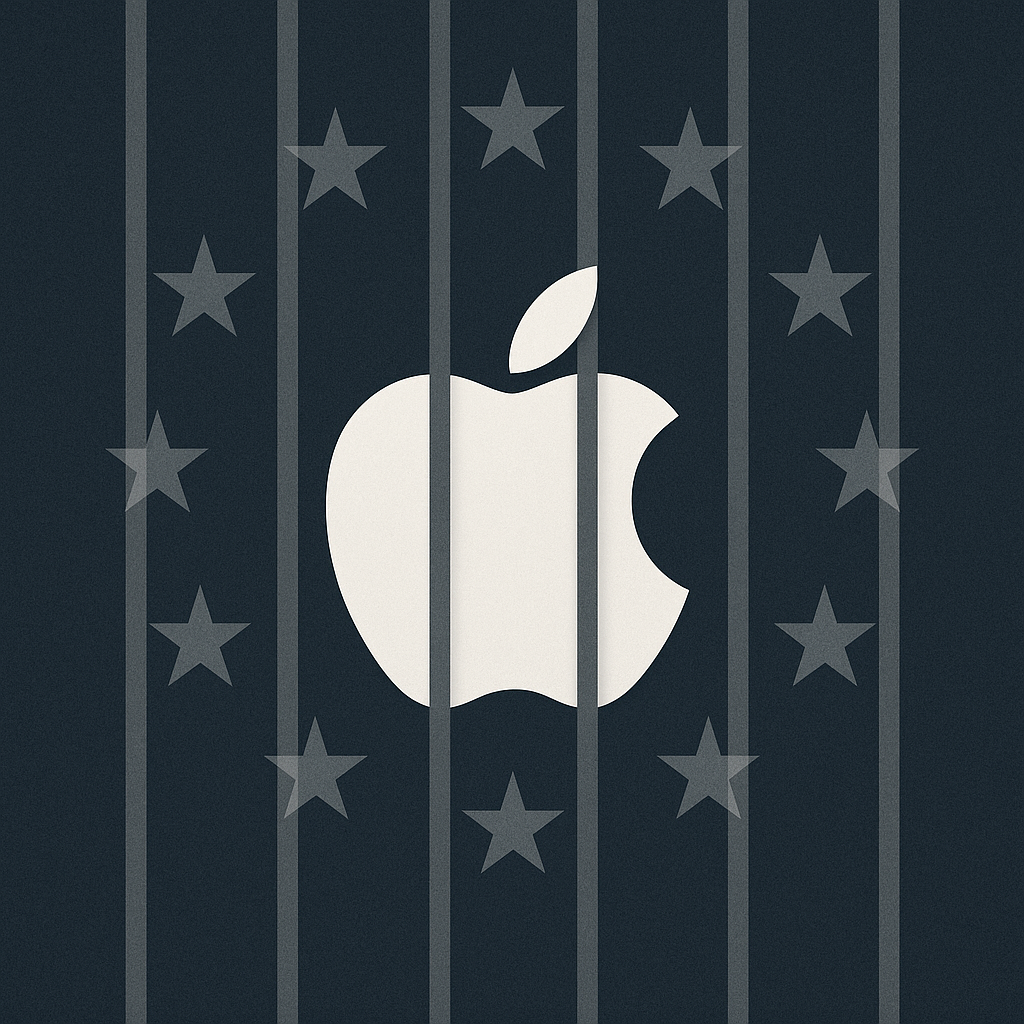Europe has become the most costly place1 in the world to experience a substandard version of everything. You pay full price — often even more — and in return get a compromised, delayed, or crippled product, courtesy of Brussels. The EU’s self-appointed tech regulators have turned what was once the world’s most innovative market into a bureaucratic maze, where each new feature must be blessed by a lawyer before it reaches your screen. And no company shows the damage more clearly than Apple.
This is not about consumer protection, and I will not hear from anyone who says otherwise. It’s about politicians chasing headlines by swinging at the biggest target they can: Apple2. The EU’s crusade against Apple, dressed up in the language of “fair competition” and “user choice,” is nothing more than a cynical power grab that has backfired spectacularly on the very people it claims to defend. The once-unified, global Apple experience is now fractured. When Tim Cook steps onto the stage to unveil something new, European users instinctively brace for the asterisk: unavailable or coming later to the EU.
The sheer absurdity of it is breathtaking. When Apple introduced Apple Intelligence last year, a suite of features running privately on-device and in secure Apple Cloud servers, it delayed the entire rollout across Europe because the EU’s Digital Markets Act was written so vaguely that no one could confidently say what was permitted and what was not3.
The rest of the world got Writing Tools, Notification Summary, and more. Europe got a waiting room until March 2025. Apple explicitly said4 the DMAs’ “regulatory uncertainties” would “compromise the integrity of our products in ways that risk user privacy and data security.” That’s Apple’s diplomatic way of saying: your own regulators made it unsafe for us to give you the same features as everyone else.
In a statement in September, Apple made clear why it’s delaying other new features in the EU. These aren’t features that risk monopolies or endanger privacy. They’re ordinary, useful tools like Live Translation on AirPods5, which doesn’t exist for EU users today. Or iPhone Mirroring, an innocuous-sounding feature that lets you control your iPhone from your Mac, is unavailable to European customers altogether.
Apple contends that the DMA requires it to make certain features work on non-Apple devices — and enabling that, it says, involves “a lot of engineering work.” The company cited the same “regulatory uncertainties.”
Scroll through European Apple forums6 and you’ll find threads full of angry customers discovering that what was promised in keynotes simply doesn’t exist for them. The phrases “coming later” and “not available in your country” have become fixtures of the European tech lexicon. The irony is cruel: the same regulators who preach consumer rights have turned European consumers into second-class citizens of the digital world.
And let’s not forget the EU’s two-faced war on privacy. This is the same bloc that unleashed endless cookie-consent pop-ups, the most obnoxious and least effective privacy measure ever conceived, and then fined Apple €150 million for its App Tracking Transparency feature. That’s the feature that actually asks your permission before an app tracks you across other apps. In any sane universe, that would be hailed as a user victory. In Brussels, it’s an antitrust violation. Apple was accused of “unfairly disadvantaging advertisers” simply because it gave people the option to opt out7. Meanwhile, Meta, whose entire business depends on collecting and monetizing user data, has made fifteen separate requests to access Apple’s private frameworks under the DMA’s “interoperability” provision8.
Apple revealed that included in those requests were some that would allow Meta to read messages, see call logs, and monitor app usage. Regulators call it competition. Apple calls it a privacy nightmare, and customers would agree. The EU calls it a chance to say that it “opened up” the ecosystem. What it really did was attempt to hand over the keys to the data-hungriest company on Earth.
The company now spends over $8 million every year lobbying the European Union, more than almost any other tech firm on the continent9. It’s not campaigning for lesser rules; it’s fighting to keep common sense alive. Apple’s lobbying has become a form of defense, an effort to remind lawmakers that forcing features before they’re secure isn’t regulation, it’s sabotage.

If there’s one thing Europeans should be angry about, it’s that their own regulators are making privacy optional. The DMA, Apple argues10, is “exposing users to new risks and disrupting the simple, seamless way their Apple products work together.” The company even highlights the absurd imbalance: the law “singles Apple out while leaving Android rivals free to continue as they always have11.”
None of it has made Europe safer, fairer, or more competitive. Its regulators have turned one of the world’s most affluent consumer markets into an afterthought. Whenever Apple teases a new feature, it issues the same carefully worded line about “complex regulatory frameworks.” Read between the lines: Europe is where innovation goes to die.
The tragedy is political.
Brussels does not care about protecting users; it cares about proving relevance. After decades of failing to produce its own tech giants, the EU has chosen an easier target: take over the ones that already exist. It’s simpler to fine Apple than to build the next one12. Policy dressed up as resentment, an inferiority complex dressed up as antitrust. Europe cannot match Silicon Valley’s pace, so it tries to drag everyone else down to its level. What’s infuriating is how that failure punishes European citizens themselves.
Europeans don’t receive the same Apple products as the rest of the world. Their hardware is handicapped by default. Their features vanish mid-sentence during Apple keynotes. They are living through an EU-imposed digital apartheid, where to be European is to pay more for less. And when they complain, they’re told it’s all in the name of fairness. Fairness is not the right to own broken hardware.
Fairness is the right to be equal to everyone else. Until Brussels understands that, Europe will keep punishing the companies that actually innovate. Apple will be fine13, it always is. But Europe’s global reputation as a home for world-class technology won’t14. It’s becoming a museum of lost potential, a warning of how bad politics and good intentions can destroy progress. So yes, the EU sucks, not for regulating, but for regulating stupidly.
It’s chasing ghost villains while the rest of the world moves on. It fines Apple for protecting privacy, delays features in the name of competition, and calls that leadership. European users deserve better. They’re owed the same full-featured, forward-moving experience Apple builds for everyone else. Until they demand it, Brussels will keep mistaking control for progress — and Europe will keep falling behind.
- Apple’s pricing in the EU reflects higher VAT rates (20–25%) and currency stabilization costs. The result: EU consumers often pay hundreds more per iPhone than U.S. customers, despite receiving delayed software features. ↩︎
- Apple is one of six firms officially labeled “gatekeepers” under the Digital Markets Act, alongside Google, Meta, Amazon, Microsoft, and ByteDance. This designation compels Apple to open iMessage, Safari, and the App Store to competitors, the source of most regulatory tension. ↩︎
- Apple Intelligence debuted globally with Writing Tools, Image Playground, and a redesigned Siri interface (the glow, not the V2 or V3 version we’re expecting in March-April 2026). EU users were told these features would not be available at launch, with Apple citing DMA uncertainty. ↩︎
- Apple’s full quote continues: “We are committed to working with the European Commission to find a path forward that allows us to bring these features to our EU users without compromising their safety or privacy.” ↩︎
- Apple says Live Translation “uses Apple’s on-device intelligence to keep conversations private,” and the company is doing “additional engineering work to ensure they won’t be exposed to other companies or developers.” (Apple statement, Sept 2025.) ↩︎
- Apple’s EU users have faced similar exclusions before, including Apple Cash, Fitness+, and Tap to Pay, all of which arrived months or years later than U.S. releases due to licensing and regulatory issues. ↩︎
- Apple’s ATT framework, introduced in 2021, led to a reported 54% drop in mobile tracking across iOS devices within the first six months (Flurry Analytics, 2022). Despite this, ad-tech groups in Europe lobbied regulators to classify it as “anticompetitive.” ↩︎
- Apple’s Dec 2024 white paper on DMA compliance noted that many of Meta’s requests were “completely unrelated to its products” and would “reduce protections around personal data.” ↩︎
- Apple’s EU lobbying doubled between 2020 and 2025, according to Transparency Register filings. The company lists its primary topics as “Digital Markets Act implementation, data protection, and sustainability.” ↩︎
- Apple’s full DMA statement (Sept 2025) warns that the EU’s approach “risks diminishing the privacy, security, and user experience” of iPhone and Mac owners in the region, stressing that Apple’s integration “was designed to protect users, not lock them in.” ↩︎
- Only Apple, not Google or Samsung, was designated a “gatekeeper” in certain mobile platform categories under the DMA. This regulatory asymmetry is what Apple refers to when it says the law “singles [it] out.” ↩︎
- Between 2017 and 2024, the European Commission fined major US tech companies more than €10 billion, including Apple, Google, and Meta, while no comparable European firm faced equivalent scrutiny. ↩︎
- Apple’s FY 2024 filing shows $97 billion in revenue from Europe, up 4% year-over-year, despite multiple EU probes and pending DMA compliance costs. ↩︎
- According to Atomico, European tech investment fell 30% in 2024, with venture funding shrinking to $42 billion — its lowest level since 2018. ↩︎
